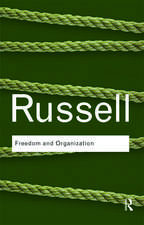Beyond Foucault: New Perspectives on Bentham's Panopticon
Editat de Anne Brunon-Ernsten Limba Engleză Hardback – 28 feb 2012
Preț: 820.71 lei
Preț vechi: 1140.92 lei
-28% Nou
Puncte Express: 1231
Preț estimativ în valută:
157.04€ • 164.40$ • 129.94£
157.04€ • 164.40$ • 129.94£
Carte tipărită la comandă
Livrare economică 07-21 aprilie
Preluare comenzi: 021 569.72.76
Specificații
ISBN-13: 9780754668435
ISBN-10: 0754668436
Pagini: 246
Dimensiuni: 156 x 234 x 22 mm
Greutate: 0.5 kg
Ediția:New.
Editura: Taylor & Francis
Colecția Routledge
Locul publicării:Oxford, United Kingdom
ISBN-10: 0754668436
Pagini: 246
Dimensiuni: 156 x 234 x 22 mm
Greutate: 0.5 kg
Ediția:New.
Editura: Taylor & Francis
Colecția Routledge
Locul publicării:Oxford, United Kingdom
Recenzii
Classified as 'Research Essential' by Baker & Taylor YBP Library Services
Notă biografică
Anne Brunon-Ernst is Senior Lecturer in Legal English at the University of Paris 2 (Panthéon-Assas) and a member of the Centre Bentham, Paris.
Cuprins
Introduction, AnneBrunon-Ernst; Part 1 Historiography Reconsidered: From Discipline to Governmentality; Chapter 1 Deconstructing Panopticism into the Plural Panopticons, AnneBrunon-Ernst; Chapter 2 From Discipline and Punish to The Birth of Biopolitics, ChristianLaval; Part 2 Status of the Panopticon in Prison, Penal and Constitutional Reform; Chapter 3 From ‘Utopia’ to ‘Programme’, Emmanuellede Champs; Chapter 4 Penal Theory without the Panopticon, Jean-PierreCléro; Chapter 5 From the Penitentiary to the Political Panoptic Paradigm, GuillaumeTusseau; Part 3 Is There a Panoptic Society? Social Control in Bentham and Foucault; Chapter 6 Transparency and Politics, Marie-LaureLeroy; Chapter 7 Social Control and the Legal Panoptic Paradigm, MalikBozzo-Rey; Chapter 101 Epilogue, AnneBrunon-Ernst, GuillaumeTusseau;
Descriere
This book combines an appreciation of Bentham's broader project with an engagement of Foucault's insights on economic government to go beyond the received reading of panopticism as a dark disciplinary technology of power. It is essential reading for historians of intellectual history but also of interest to students of contemporary surveillance and society.













